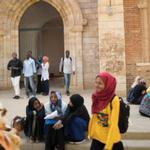Women in liminal spaces: War and displacement in Sudan
Despite obvious and profound human and material destruction of armed conflict, existing research highlights women’s agency and resilience and suggest that war has the potential to transform patriarchal gender norms and roles. In this article, we claim that the current literature tends to romanticize women’s resilience in ways in which absolves the international community from taking responsibility/taking action because it gives the impression that women are somewhat empowered by war and destruction. Although we acknowledge that women are taking new roles, including as breadwinners, during the on-going conflict in Sudan which has displaced 12 million Sudanese, we caution against only highlighting what often is being termed as “empowerment”. As Naila Kabeer reminds us, empowerment necessitates a choice between alternatives, something which millions of Sudanese women presently do not have. Through unique and original interview data from Sudan during the on-going armed conflict, we focus on women displaced from Khartoum to eastern and northern Sudan and the loss of freedom and safety in their daily lives. Whereas families put restrictions on how to dress, movement in public spaces, the warring parties use sexual violence as a weapon of war. The result is pushing women back into the private sphere “where they belong”, but those spaces are currently destroyed, or occupied by either soldiers or displaced family members, and this poses a (re)negotiation of gendered practices, in parallel with a shift in boundaries between private/ public and individual/collective.
The paper was presented as part of a SNAC organized panel on Sudanese displacement: capital, identity and agency organized by Munzoul Assal and Mari Norbakk
Liv Tønnessen







